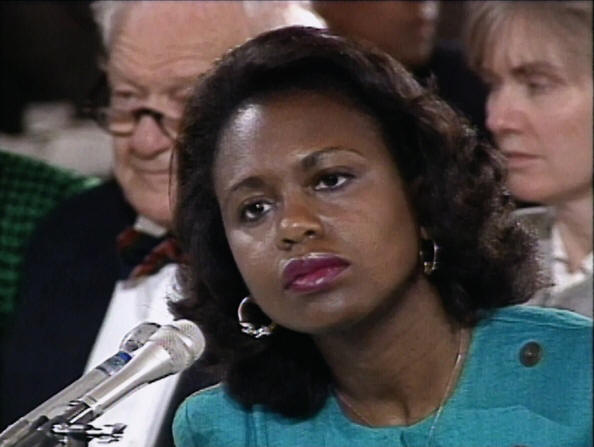MOVIE REVIEWS |
INTERVIEWS |
YOUTUBE |
NEWS
|
EDITORIALS | EVENTS |
AUDIO |
ESSAYS |
ARCHIVES |
CONTACT
|
PHOTOS |
COMING SOON|
EXAMINER.COM FILM ARTICLES
||HOME


Wednesday, March 19, 2014
MOVIE REVIEW
Anita: Speaking Truth To Power
Standing Tall At Her Most Humiliating Public Hour

Anita Hill
testifying during the Senate Judiciary Committee Supreme Court Hearings for
Clarence Thomas in October 1991.
American Film Festival
by
Omar P.L. Moore/PopcornReel.com
 FOLLOW
FOLLOW
Wednesday,
March 19,
2014
After
Rosa Parks,
Autherine Lucy, Vivian Jones and Angela Davis, Anita Hill may well represent one
of the seminal activist moments for black women and the rest of America in the
second half of 20th century. Her testimony during the Clarence Thomas
Senate Judiciary Supreme Court justice confirmation hearings in October 1991, in
which Ms. Hill accused Mr. Thomas of sexual harassment at the Equal Employment
Opportunity Committee, were viewed live on television by millions.
Freida Mock's 75-minute documentary "Anita: Speaking Truth To Power" solemnly
chronicles that incendiary 1991 spectacle of humiliation for Professor Hill, an
accomplished lawyer who continues to teach at Brandeis University. The
first 45 minutes of "Anita" focus on the racial and sexual politics of an
all-white male U.S. Senate Judiciary Committee's somewhat naive, prurient and
accusatory questioning of Ms. Hill, whose allegations were backed up by a
polygraph examination she passed.
Riveting and uplifting at times, "Anita" is told in Ms. Hill's own words through
interviews conducted with her in 2010, the year much of the second half of
"Anita" is centered. The film's last half-hour is sobering and moving, an
intimate glimpse of the woman behind the prime-time hearing and its scandalous
headlines, which preceded the frenzied climate surrounding a stained blue dress.
Though "Anita" discusses race (Mr. Thomas's impossible "high-tech lynching"
comment and real racial dynamics), the film is remarkably "race-neutral", even
though we learn of the racial hatreds Ms. Hill's grandfather suffered in
Oklahoma, her native state. Ms. Mock briefly wades into the black
woman-black man dynamic present before the Senate Judiciary Committee hearing, a
renewed tension evoking some of the harshest and most complex effects of
slavery. Harvard professor and lawyer Charles Ogletree, a counselor to Ms.
Hill at the hearings, mentions that he was one of her few prominent black male
defenders in 1991.
Ms. Hill is a private, humble and modest figure, or, as she recalls her mother
describing her, stubborn. Her resilience in the face of death threats and
the willingness to fight back against the alleged sexually inappropriate
behavior by the then-head of the EEOC was gutsy. Ms. Hill's very public
stand is now more than ever seen as some inspirational fuel in the women's
rights movement in America. (Strangely, in making the case that sexual
harassment was a new phenomena in America in 1991 "Anita" doesn't mention the
Tailhook Scandal, which occurred just a month before Ms. Hill's testimony.)
That said, "Anita" which is obviously and appropriately singular to its subject
and wholly relevant in 2014, acknowledges that Ms. Hill's 15 minutes of fame
ignited a reinvigorated fight against gender inequality and sexual harassment,
one that saw a unification of women along all races, a sisterhood, which sadly
is more fractured today than it was then. Today Ms. Hill is a faint memory
to some but "Anita" will remind many of those tabloid times that are commonplace
now. (On a larger scale now, Marissa Alexander and Renisha McBride are the
new symbols of justice or injustice in America, two black women who have yet to
receive the kind of just treatment their situations merit.)
Peaceful, calm and leisurely, "Anita" recasts a woman seen largely as a villain
in America (before many came around to her defense and support) the way Tawana
Brawley was just a few years before. Black women in America are usually
the last to be believed on anything, especially accusations made about sexual
violence perpetrated against them. Behind that fact lies deep-seated
racist sexual stereotypes held by many about black women. Some of those
stereotypes persist in many music videos, including in performances by white
performers like Miley Cyrus and
Lily
Allen.
Without making her too much of a talisman "Anita" heralds its charismatic,
beautiful and wonderfully engaging figure, who gives this important film energy
and insight. Aside from her book Speaking Truth To Power, about
the turbulence of 1991, Ms. Hill has largely avoided huge spotlights. Most
of "Anita" has overtones of class in feel and procedure, though the subject of
class is hardly mentioned. Journalists Jane Mayer, an excellent
investigative reporter, and Jill Abramson of The New York Times, who together
wrote the book Strange Justice, about the Hill-Thomas hearings, are
among numerous people interviewed in "Anita".
Most memorably though, Ms. Mock's film begins with a bizarre telephone voicemail
message left with Anita Hill at 7:30am on a Saturday in October 2010, nearly
twenty years after Professor Hill's testimony. The message is from
Virginia Lamp Thomas, the wife of the now-Supreme Court justice. "I would
love you to consider an apology sometime and some full explanation of why you
did what you did with my husband...have a good day."
"Anita: Speaking Truth To Power" is not rated by the Motion Picture Association Of
America. It contains descriptive sexual language, specifically that spoken
in the 1991 hearings. The film's running time is one hour
and 16 minutes.
COPYRIGHT 2014. POPCORNREEL.COM. ALL RIGHTS RESERVED.  FOLLOW
FOLLOW
MOVIE REVIEWS |
INTERVIEWS |
YOUTUBE |
NEWS
|
EDITORIALS | EVENTS |
AUDIO |
ESSAYS |
ARCHIVES |
CONTACT
| PHOTOS |
COMING SOON|
EXAMINER.COM FILM ARTICLES
||HOME


 FOLLOW
TWEET
FOLLOW
TWEET FOLLOW
FOLLOW